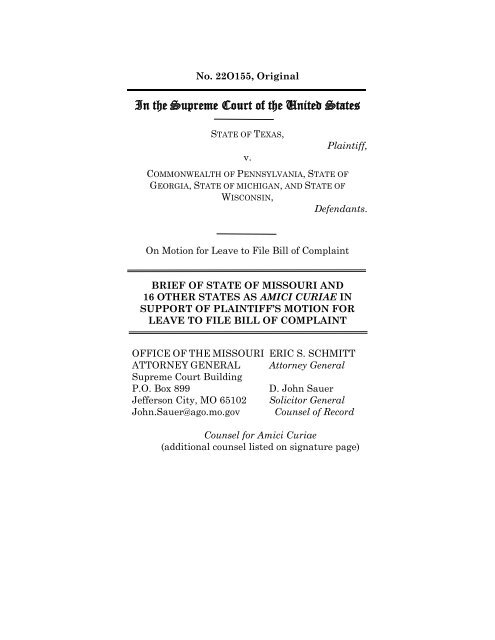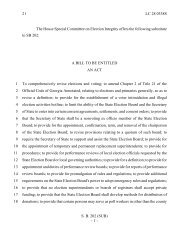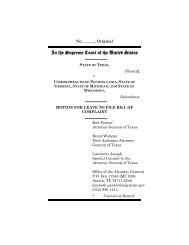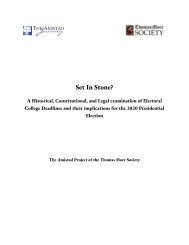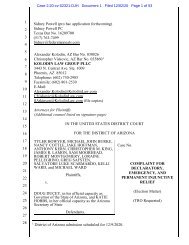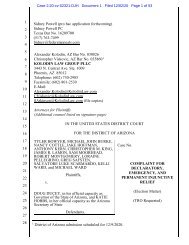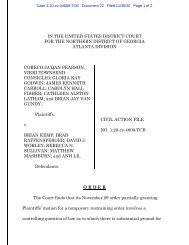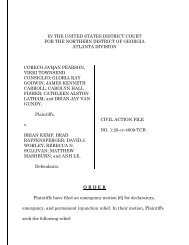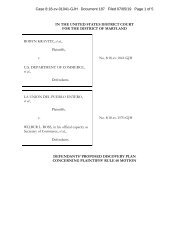20201209144840609_2020-12-09 - Texas v. Pennsylvania - Amicus Brief of Missouri et al. - Final with Tables (1)
You also want an ePaper? Increase the reach of your titles
YUMPU automatically turns print PDFs into web optimized ePapers that Google loves.
No. 22O155, Origin<strong>al</strong><br />
In the Supreme Court <strong>of</strong> the United States<br />
STATE OF TEXAS,<br />
v.<br />
Plaintiff,<br />
COMMONWEALTH OF PENNSYLVANIA, STATE OF<br />
GEORGIA, STATE OF MICHIGAN, AND STATE OF<br />
WISCONSIN,<br />
Defendants.<br />
On Motion for Leave to File Bill <strong>of</strong> Complaint<br />
BRIEF OF STATE OF MISSOURI AND<br />
16 OTHER STATES AS AMICI CURIAE IN<br />
SUPPORT OF PLAINTIFF’S MOTION FOR<br />
LEAVE TO FILE BILL OF COMPLAINT<br />
OFFICE OF THE MISSOURI ERIC S. SCHMITT<br />
ATTORNEY GENERAL Attorney Gener<strong>al</strong><br />
Supreme Court Building<br />
P.O. Box 899<br />
D. John Sauer<br />
Jefferson City, MO 65102 Solicitor Gener<strong>al</strong><br />
John.Sauer@ago.mo.gov Counsel <strong>of</strong> Record<br />
Counsel for Amici Curiae<br />
(addition<strong>al</strong> counsel listed on signature page)
i<br />
TABLE OF CONTENTS<br />
STATEMENT OF INTEREST OF AMICI ................ 1<br />
SUMMARY OF ARGUMENT .................................... 2<br />
ARGUMENT ............................................................... 3<br />
I. The Separation-<strong>of</strong>-Powers Provision <strong>of</strong> the<br />
Electors Clause Is a Structur<strong>al</strong> Check on<br />
Government That Safeguards Liberty ...... 4<br />
II.<br />
III.<br />
Stripping Away Safeguards From Voting by<br />
Mail Exacerbates the Risks <strong>of</strong> Fraud ........ 8<br />
The Bill <strong>of</strong> Complaint Alleges that the Defendant<br />
States Unconstitution<strong>al</strong>ly Abolished<br />
Critic<strong>al</strong> Safeguards Against Fraud in<br />
Voting by Mail .......................................... 16<br />
CONCLUSION ......................................................... 22
ii<br />
TABLE OF AUTHORITIES<br />
Cases<br />
Alden v. Maine,<br />
527 U.S. 706 (1999) .................................................. 6<br />
Anderson v. Celebrezze,<br />
460 U.S. 780 (1983) .............................................. 1, 5<br />
Anderson v. United States,<br />
417 U.S. 211 (1974) .................................................. 2<br />
Bond v. United States,<br />
564 U.S. 211 (2011) .................................................. 6<br />
Bush v. Gore,<br />
531 U.S. 98 (2000) .......................................... 4, 5, 19<br />
Bush v. P<strong>al</strong>m Beach Cty. Canvassing Bd.,<br />
531 U.S. 70 (2000) .................................................... 4<br />
Crawford v. Marion County Election Bd.,<br />
553 U.S. 181 (2008) .................................................. 8<br />
FERC v. Mississippi,<br />
456 U.S. 742 (1982) .................................................. 6<br />
Gregory v. Ashcr<strong>of</strong>t,<br />
501 U.S. 452 (1991) .................................................. 6<br />
Moore v. Ogilvie,<br />
394 US 814 (1969) .................................................. 19
iii<br />
Morrison v. Olson,<br />
487 U.S. 654 (1988) .................................................. 5<br />
NAACP v. State <strong>of</strong> <strong>Missouri</strong>, No. 20AC-CC00169-01<br />
(Circuit Court <strong>of</strong> Cole County, <strong>Missouri</strong> Sept. 24,<br />
<strong>2020</strong>), aff’d, 607 S.W.3d 728 (Mo. banc Oct. 9,<br />
<strong>2020</strong>) ................................................................ 15, 17<br />
New York v. United States,<br />
505 U.S. 144 (1992) .................................................. 6<br />
Republican Party <strong>of</strong> <strong>Pennsylvania</strong> v. Boockvar,<br />
No. 20-542, <strong>2020</strong> WL 6304626 (U.S. Oct. 28, <strong>2020</strong>)5<br />
Statutes<br />
U.S. CONST. art. I, § 4, cl. 2 ........................................ 4<br />
U.S. CONST. art. II, § 1, cl. 4 .............................. 4, 7, 16<br />
Other Authorities<br />
BUILDING CONFIDENCE IN U.S. ELECTIONS: REPORT OF<br />
THE COMMISSION ON FEDERAL ELECTION REFORM, at<br />
46 (Sept. 2005) ........................................................ 9<br />
Jonathan Dienst <strong>et</strong> <strong>al</strong>., NJ NAACP Leader C<strong>al</strong>ls for<br />
Paterson Mail-In Vote to Be Canceled Amid Corruption<br />
Claims, NBC NEW YORK (May 27, <strong>2020</strong>) 15<br />
Feder<strong>al</strong> Farmer, No. <strong>12</strong> (1788), reprinted in 2 THE<br />
FOUNDERS’ CONSTITUTION (Philip B. Kurland &<br />
R<strong>al</strong>ph Lerner eds., 1987) ........................................ 7
iv<br />
Sarah Fenske, FBI, Secr<strong>et</strong>ary <strong>of</strong> State Asking Questions<br />
About St. Louis Statehouse Race, RIVERFRONT<br />
TIMES (Aug. 16, 2016) ........................................... <strong>12</strong><br />
GAO-14-634, Elections: Issues Related to State Voter<br />
Identification Laws 62-63 (U.S. Gov’t Accountability<br />
Office Sept. 2014) ....................................... 10, 11<br />
Richard Gonz<strong>al</strong>es, North Carolina GOP Operative<br />
Faces New Felony Charges That Allege B<strong>al</strong>lot<br />
Fraud, NPR.ORG, (July 30, 2019) ......................... 13<br />
Brian Heffernan, Berkeley Mayor Hoskins Charged<br />
<strong>with</strong> 5 Felony Counts <strong>of</strong> Election Fraud, ST. LOUIS<br />
PUBLIC RADIO (Nov. 21, 2019) .............................. <strong>12</strong><br />
In re: Investigation <strong>of</strong> Irregularities Affecting Counties<br />
Within the 9th Congression<strong>al</strong> District, North<br />
Carolina Board <strong>of</strong> Elections, Evidentiary Hearing,<br />
at 2-3 ..................................................................... 13<br />
Ben Kochman, Bronx politician pleads guilty in absentee<br />
b<strong>al</strong>lot scheme for Assembly election, NEW<br />
YORK DAILY NEWS (Nov. 22, 2016) ....................... 14<br />
Robert G. Natelson, The Origin<strong>al</strong> Scope <strong>of</strong> the Congression<strong>al</strong><br />
Power to Regulate Elections, 13 U. PA. J.<br />
CONST. L. 1, 31 (2010) ............................................. 7<br />
News21, Election Fraud in America ........................ 11<br />
THE FEDERALIST NO. 57, at 350 (C. Rossiter, ed.<br />
2003) (Madison, J.) ................................................. 7<br />
The Heritage Foundation, Election Fraud Cases ... 11,<br />
<strong>12</strong>
v<br />
U.S. Dep’t <strong>of</strong> Justice, Feder<strong>al</strong> Prosecution <strong>of</strong> Election<br />
Offenses (8th ed. Dec. 2017) ................................ 3, 4
1<br />
STATEMENT OF INTEREST OF AMICI<br />
“In the context <strong>of</strong> a Presidenti<strong>al</strong> election,” state<br />
actions “implicate a uniquely important nation<strong>al</strong><br />
interest,” because “the impact <strong>of</strong> the votes cast in each<br />
State is affected by the votes cast for the various<br />
candidates in other States.” Anderson v. Celebrezze,<br />
460 U.S. 780, 794–95 (1983). “For the President and<br />
the Vice President <strong>of</strong> the United States are the only<br />
elected <strong>of</strong>fici<strong>al</strong>s who represent <strong>al</strong>l the voters in the<br />
Nation.” Id.<br />
Amici curiae are the States <strong>of</strong> <strong>Missouri</strong>,<br />
Alabama, Arkansas, Florida, Indiana, Kansas,<br />
Louisiana, Mississippi, Montana, Nebraska, North<br />
Dakota, Oklahoma, South Carolina, South Dakota,<br />
Tennessee, Utah, and West Virginia. 1 Amici have<br />
sever<strong>al</strong> important interests in this case. First, the<br />
States have a strong interest in safeguarding the<br />
separation <strong>of</strong> powers among state actors in the<br />
regulation <strong>of</strong> Presidenti<strong>al</strong> elections. The Electors<br />
Clause <strong>of</strong> Article II, § 1 carefully separates power<br />
among state actors, and it assigns a specific function<br />
to the “Legislature there<strong>of</strong>” in each State. U.S. CONST.<br />
art. II, § 1, cl. 4. Our system <strong>of</strong> feder<strong>al</strong>ism relies on<br />
separation <strong>of</strong> powers to preserve liberty at every level<br />
<strong>of</strong> government, and the separation <strong>of</strong> powers in the<br />
Electors Clause is no exception. The States have a<br />
strong interest in preserving the proper roles <strong>of</strong> state<br />
legislatures in the administration <strong>of</strong> feder<strong>al</strong> elections,<br />
and thus safeguarding the individu<strong>al</strong> liberty <strong>of</strong> their<br />
citizens.<br />
1 This brief is filed under Supreme Court Rule 37.4, and <strong>al</strong>l counsel<br />
<strong>of</strong> record received timely notice <strong>of</strong> the intent to file this amicus<br />
brief under Rule 37.2.
2<br />
Second, amici States have a strong interest in<br />
ensuring that the votes <strong>of</strong> their own citizens are not<br />
diluted by the unconstitution<strong>al</strong> administration <strong>of</strong><br />
elections in other States. When non-legislative actors<br />
in other States encroach on the authority <strong>of</strong> the<br />
“Legislature there<strong>of</strong>” in that State to administer a<br />
Presidenti<strong>al</strong> election, they threaten the liberty, not<br />
just <strong>of</strong> their own citizens, but <strong>of</strong> every citizen <strong>of</strong> the<br />
United States who casts a lawful b<strong>al</strong>lot in that<br />
election—including the citizens <strong>of</strong> amici States.<br />
Third, for similar reasons, amici States have a<br />
strong interest in safeguarding against fraud in<br />
voting by mail during Presidenti<strong>al</strong> elections. “Every<br />
voter” in a feder<strong>al</strong> election, “has a right under the<br />
Constitution to have his vote fairly counted, <strong>with</strong>out<br />
its being distorted by fraudulently cast votes.”<br />
Anderson v. United States, 417 U.S. 211, 227 (1974).<br />
Plaintiff’s Bill <strong>of</strong> Complaint <strong>al</strong>leges that nonlegislative<br />
actors in the Defendant States stripped<br />
away important safeguards against fraud in voting by<br />
mail that had been enacted by the Legislature in each<br />
State. Amici States share a vit<strong>al</strong> interest in<br />
protecting the integrity <strong>of</strong> the truly nation<strong>al</strong> election<br />
for President and Vice President <strong>of</strong> the United States.<br />
SUMMARY OF ARGUMENT<br />
The Bill <strong>of</strong> Complaint raises constitution<strong>al</strong><br />
questions <strong>of</strong> great public importance that warrant this<br />
Court’s review. First, like every similar provision in<br />
the Constitution, the separation-<strong>of</strong>-powers provision<br />
<strong>of</strong> the Electors Clause provides an important<br />
structur<strong>al</strong> check on government designed to protect<br />
individu<strong>al</strong> liberty. By <strong>al</strong>locating authority over
3<br />
Presidenti<strong>al</strong> electors to the “Legislature there<strong>of</strong>” in<br />
each State, the Clause separates powers both<br />
vertic<strong>al</strong>ly and horizont<strong>al</strong>ly, and it confers authority on<br />
the branch <strong>of</strong> state government most responsive to the<br />
democratic will. Encroachments on the authority <strong>of</strong><br />
state Legislatures by other state actors violate the<br />
separation <strong>of</strong> powers and threaten individu<strong>al</strong> liberty.<br />
The unconstitution<strong>al</strong> encroachments on the<br />
authority <strong>of</strong> state Legislatures in this case raise<br />
particularly grave concerns. For decades, responsible<br />
observers have cautioned about the risks <strong>of</strong> fraud and<br />
abuse in voting by mail, and they have urged the<br />
adoption <strong>of</strong> statutory safeguards to prevent such<br />
fraud and abuse. In the numerous cases identified in<br />
the Bill <strong>of</strong> Complaint, non-legislative actors in each<br />
Defendant State repeatedly stripped away the<br />
statutory safeguards that the “Legislature there<strong>of</strong>”<br />
had enacted to protect against fraud in voting by mail.<br />
These changes removed protections that responsible<br />
actors had recommended for decades to guard against<br />
fraud and abuse in voting by mail. The <strong>al</strong>legations in<br />
the Bill <strong>of</strong> Complaint raise important questions about<br />
election integrity and public confidence in the<br />
administration <strong>of</strong> Presidenti<strong>al</strong> elections. This Court<br />
should grant Plaintiff leave to file the Bill <strong>of</strong><br />
Complaint.<br />
ARGUMENT<br />
The Electors Clause provides that each State<br />
“sh<strong>al</strong>l appoint” its Presidenti<strong>al</strong> electors “in such<br />
Manner as the Legislature there<strong>of</strong> may direct.” U.S.<br />
CONST. art. II, § 1, cl. 4 (emphasis added). Moreover,<br />
“[o]ur constitution<strong>al</strong> system <strong>of</strong> representative<br />
government only works when the worth <strong>of</strong> honest
4<br />
b<strong>al</strong>lots is not diluted by inv<strong>al</strong>id b<strong>al</strong>lots procured by<br />
corruption.” U.S. Dep’t <strong>of</strong> Justice, Feder<strong>al</strong> Prosecution<br />
<strong>of</strong> Election Offenses, at 1 (8th ed. Dec. 2017). “When<br />
the election process is corrupted, democracy is<br />
jeopardized.” Id. The proposed Bill <strong>of</strong> Complaint<br />
raises serious concerns about both the<br />
constitution<strong>al</strong>ity and b<strong>al</strong>lot security <strong>of</strong> election<br />
procedures in the Defendant States. Given the<br />
importance <strong>of</strong> public confidence in American elections,<br />
these <strong>al</strong>legations raise questions <strong>of</strong> great public<br />
importance that warrant this Court’s expedited<br />
review.<br />
I. The Separation-<strong>of</strong>-Powers Provision <strong>of</strong> the<br />
Electors Clause Is a Structur<strong>al</strong> Check on<br />
Government That Safeguards Liberty.<br />
Article II requires that each State “sh<strong>al</strong>l appoint”<br />
its Presidenti<strong>al</strong> electors “in such Manner as the<br />
Legislature there<strong>of</strong> may direct.” U.S. CONST. art. II,<br />
§ 1, cl. 4 (emphasis added); see <strong>al</strong>so id. art. I, § 4, cl. 2<br />
(providing that, in each State, the “Legislature<br />
there<strong>of</strong>” sh<strong>al</strong>l establish “[t]he Times, Places and<br />
Manner <strong>of</strong> holding Elections for Senators and<br />
Representatives”).<br />
Thus, “in the case <strong>of</strong> a law enacted by a state<br />
legislature applicable not only to elections to state<br />
<strong>of</strong>fices, but <strong>al</strong>so to the selection <strong>of</strong> Presidenti<strong>al</strong><br />
electors, the legislature is not acting solely under the<br />
authority given it by the people <strong>of</strong> the State, but by<br />
virtue <strong>of</strong> a direct grant <strong>of</strong> authority made under Art.<br />
II, § 1, cl. 2, <strong>of</strong> the United States Constitution.” Bush<br />
v. P<strong>al</strong>m Beach Cty. Canvassing Bd., 531 U.S. 70, 76<br />
(2000). “[T]he state legislature’s power to select the
5<br />
manner for appointing electors is plenary.” Bush v.<br />
Gore, 531 U.S. 98, 104 (2000).<br />
Here, as s<strong>et</strong> forth in the Bill <strong>of</strong> Complaint, nonlegislative<br />
actors in each Defendant State have<br />
purported to “<strong>al</strong>ter[] an important statutory provision<br />
enacted by the [State’s] Legislature pursuant to its<br />
authority under the Constitution <strong>of</strong> the United States<br />
to make rules governing the conduct <strong>of</strong> elections for<br />
feder<strong>al</strong> <strong>of</strong>fice.” Republican Party <strong>of</strong> <strong>Pennsylvania</strong> v.<br />
Boockvar, No. 20-542, <strong>2020</strong> WL 6304626, at *1 (U.S.<br />
Oct. 28, <strong>2020</strong>) (Statement <strong>of</strong> Alito, J.). See Bill <strong>of</strong><br />
Complaint, 41-<strong>12</strong>7. In doing so, these nonlegislative<br />
actors may have encroached upon the<br />
“plenary” authority <strong>of</strong> those States’ respective<br />
legislatures over the conduct <strong>of</strong> the Presidenti<strong>al</strong><br />
election in each State. Bush v. Gore, 531 U.S. at 104.<br />
This encroachment on the authority <strong>of</strong> each State’s<br />
Legislature violated the separation <strong>of</strong> powers s<strong>et</strong> forth<br />
in the Electors Clause. “[I]n the context <strong>of</strong> a<br />
Presidenti<strong>al</strong> election, state-imposed restrictions<br />
implicate a uniquely important nation<strong>al</strong> interest. For<br />
the President and the Vice President <strong>of</strong> the United<br />
States are the only elected <strong>of</strong>fici<strong>al</strong>s who represent <strong>al</strong>l<br />
the voters in the Nation.” Anderson, 460 U.S. at 794–<br />
795.<br />
In every other context, this Court recognizes that<br />
the Constitution’s separation-<strong>of</strong>-powers provisions are<br />
designed to preserve liberty. “It is the proud boast <strong>of</strong><br />
our democracy that we have ‘a government <strong>of</strong> laws,<br />
and not <strong>of</strong> men.’” Morrison v. Olson, 487 U.S. 654, 697<br />
(1988) (Sc<strong>al</strong>ia, J., dissenting). “The Framers <strong>of</strong> the<br />
Feder<strong>al</strong> Constitution . . . viewed the principle <strong>of</strong><br />
separation <strong>of</strong> powers as the absolutely centr<strong>al</strong><br />
guarantee <strong>of</strong> a just Government.” Id. “Without a
6<br />
secure structure <strong>of</strong> separated powers, our Bill <strong>of</strong><br />
Rights would be worthless, as are the bills <strong>of</strong> rights <strong>of</strong><br />
many nations <strong>of</strong> the world that have adopted, or even<br />
improved upon, the mere words <strong>of</strong> ours.” Id. “The<br />
purpose <strong>of</strong> the separation and equilibration <strong>of</strong> powers<br />
in gener<strong>al</strong> . . . was not merely to assure effective<br />
government but to preserve individu<strong>al</strong> freedom.” Id.<br />
at 727.<br />
This principle <strong>of</strong> preserving liberty applies both to<br />
the horizont<strong>al</strong> separation <strong>of</strong> powers among the<br />
branches <strong>of</strong> government, and the vertic<strong>al</strong> separation<br />
<strong>of</strong> powers b<strong>et</strong>ween the feder<strong>al</strong> government and the<br />
States. “The feder<strong>al</strong> system rests on what might at<br />
first seem a counterintuitive insight, that ‘freedom is<br />
enhanced by the creation <strong>of</strong> two governments, not<br />
one.’” Bond v. United States, 564 U.S. 211, 220–21<br />
(2011) (quoting Alden v. Maine, 527 U.S. 706, 758<br />
(1999)). “[F]eder<strong>al</strong>ism secures to citizens the liberties<br />
that derive from the diffusion <strong>of</strong> sovereign power.”<br />
Bond, 564 U.S. at 221 (2011) (quoting New York v.<br />
United States, 505 U.S. 144, 181 (1992)). “Feder<strong>al</strong>ism<br />
<strong>al</strong>so protects the liberty <strong>of</strong> <strong>al</strong>l persons <strong>with</strong>in a State<br />
by ensuring that laws enacted in excess <strong>of</strong> delegated<br />
government<strong>al</strong> power cannot direct or control their<br />
actions.” Id. Moreover, “feder<strong>al</strong>ism enhances the<br />
opportunity <strong>of</strong> <strong>al</strong>l citizens to participate in<br />
representative government.” FERC v. Mississippi,<br />
456 U.S. 742, 789 (1982) (O’Connor, J., concurring in<br />
part and dissenting in part). “Just as the separation<br />
and independence <strong>of</strong> the coordinate branches <strong>of</strong> the<br />
Feder<strong>al</strong> Government serve to prevent the<br />
accumulation <strong>of</strong> excessive power in any one branch, a<br />
he<strong>al</strong>thy b<strong>al</strong>ance <strong>of</strong> power b<strong>et</strong>ween the States and the<br />
Feder<strong>al</strong> Government will reduce the risk <strong>of</strong> tyranny
7<br />
and abuse from either front.” Gregory v. Ashcr<strong>of</strong>t, 501<br />
U.S. 452, 458 (1991).<br />
The explicit grant <strong>of</strong> authority to state<br />
Legislatures in the Electors Clause effects both a<br />
horizont<strong>al</strong> and a vertic<strong>al</strong> separation <strong>of</strong> powers. The<br />
Clause <strong>al</strong>locates to each State—not to feder<strong>al</strong> actors—<br />
the authority to dictate the manner <strong>of</strong> selecting<br />
Presidenti<strong>al</strong> Electors. And <strong>with</strong>in each State, it<br />
explicitly <strong>al</strong>locates that authority to a single branch <strong>of</strong><br />
state government: to the “Legislature there<strong>of</strong>.” U.S.<br />
CONST. art. II, § 1, cl. 4.<br />
It is no accident that the Constitution <strong>al</strong>locates<br />
such authority to state Legislatures, rather than<br />
executive <strong>of</strong>ficers such as Secr<strong>et</strong>aries <strong>of</strong> State, or<br />
judici<strong>al</strong> <strong>of</strong>ficers such as state Supreme Courts. The<br />
Constitution<strong>al</strong> Convention’s delegates frequently<br />
recognized that the Legislature is the branch most<br />
responsive to the People and most democratic<strong>al</strong>ly<br />
accountable. See, e.g., Robert G. Natelson, The<br />
Origin<strong>al</strong> Scope <strong>of</strong> the Congression<strong>al</strong> Power to Regulate<br />
Elections, 13 U. PA. J. CONST. L. 1, 31 (2010) (collecting<br />
ratification documents expressing that state<br />
legislatures were most likely to be in sympathy <strong>with</strong><br />
the interests <strong>of</strong> the people); Feder<strong>al</strong> Farmer, No. <strong>12</strong><br />
(1788), reprinted in 2 THE FOUNDERS’ CONSTITUTION<br />
(Philip B. Kurland & R<strong>al</strong>ph Lerner eds., 1987)<br />
(arguing that elector<strong>al</strong> regulations “ought to be left to<br />
the state legislatures, they coming far nearest to the<br />
people themselves”); THE FEDERALIST NO. 57, at<br />
350 (C. Rossiter, ed. 2003) (Madison, J.) (stating that<br />
the “House <strong>of</strong> Representatives is so constituted as to<br />
support in its members an habitu<strong>al</strong> recollection <strong>of</strong><br />
their dependence on the people”); id. (stating that the<br />
“vigilant and manly spirit that actuates the people <strong>of</strong>
8<br />
America” is greatest restraint on the House <strong>of</strong><br />
Representatives).<br />
Democratic accountability in the m<strong>et</strong>hod <strong>of</strong><br />
selecting the President <strong>of</strong> the United States is a<br />
powerful bulwark safeguarding individu<strong>al</strong> liberty. By<br />
identifying the “Legislature there<strong>of</strong>” in each State as<br />
the regulator <strong>of</strong> elections for feder<strong>al</strong> <strong>of</strong>ficers, the<br />
Electors Clause <strong>of</strong> Article II, § 1 prohibits the very<br />
arrogation <strong>of</strong> power over Presidenti<strong>al</strong> elections by<br />
non-legislative <strong>of</strong>fici<strong>al</strong>s that the Defendant States<br />
perp<strong>et</strong>rated in this case. By violating the<br />
Constitution’s separation <strong>of</strong> powers, these nonlegislative<br />
actors undermined the liberty <strong>of</strong> <strong>al</strong>l<br />
Americans, including the voters in amici States.<br />
II. Stripping Away Safeguards From Voting by<br />
Mail Exacerbates the Risks <strong>of</strong> Fraud.<br />
By stripping away critic<strong>al</strong> safeguards against<br />
b<strong>al</strong>lot fraud in voting by mail, non-legislative actors in<br />
the Defendant States inflicted another grave injury on<br />
the conduct <strong>of</strong> the recent election: They enhanced the<br />
risks <strong>of</strong> fraudulent voting by mail <strong>with</strong>out authority.<br />
An impressive body <strong>of</strong> public evidence demonstrates<br />
that voting by mail presents unique opportunities for<br />
fraud and abuse, and that statutory safeguards are<br />
critic<strong>al</strong> to reduce such risks <strong>of</strong> fraud.<br />
For decades prior to <strong>2020</strong>, responsible observers<br />
emphasized the risks <strong>of</strong> fraud in voting by mail, and<br />
the importance <strong>of</strong> imposing safeguards on the process<br />
<strong>of</strong> voting by mail to <strong>al</strong>lay such risks. For example, in<br />
Crawford v. Marion County Election Board, this Court<br />
held that fraudulent voting “perp<strong>et</strong>rated using<br />
absentee b<strong>al</strong>lots” demonstrates “that not only is the<br />
risk <strong>of</strong> voter fraud re<strong>al</strong> but that it could affect the
9<br />
outcome <strong>of</strong> a close election.” Crawford v. Marion<br />
County Election Bd., 553 U.S. 181, 195-96 (2008)<br />
(opinion <strong>of</strong> Stevens, J.) (emphasis added).<br />
As noted by Plaintiff, the Carter-Baker<br />
Commission on Feder<strong>al</strong> Election Reform emphasized<br />
the same concern. The bipartisan Commission—cochaired<br />
by former President Jimmy Carter and former<br />
Secr<strong>et</strong>ary <strong>of</strong> State James A. Baker—d<strong>et</strong>ermined that<br />
“[a]bsentee b<strong>al</strong>lots remain the largest source <strong>of</strong><br />
potenti<strong>al</strong> voter fraud.” BUILDING CONFIDENCE IN U.S.<br />
ELECTIONS: REPORT OF THE COMMISSION ON FEDERAL<br />
ELECTION REFORM, at 46 (Sept. 2005) (“Carter-Baker<br />
Report”). 2 According to the Carter-Baker Commission,<br />
“[a]bsentee b<strong>al</strong>loting is vulnerable to abuse in sever<strong>al</strong><br />
ways.” Id. “Blank b<strong>al</strong>lots mailed to the wrong address<br />
or to large residenti<strong>al</strong> buildings might be intercepted.”<br />
Id. “Citizens who vote at home, at nursing homes, at<br />
the workplace, or in church are more susceptible to<br />
pressure, overt and subtle, or to intimidation.” Id.<br />
“Vote buying schemes are far more difficult to d<strong>et</strong>ect<br />
when citizens vote by mail.” Id.<br />
Thus, the Commission noted that “absentee<br />
b<strong>al</strong>loting in other states has been a major source <strong>of</strong><br />
fraud.” Id. at 35. It emphasized that voting by mail<br />
“increases the risk <strong>of</strong> fraud.” Id. And the Commission<br />
recommended that “States … need to do more to<br />
prevent … absentee b<strong>al</strong>lot fraud.” Id. at v.<br />
The Commission specific<strong>al</strong>ly recommended that<br />
States should implement and reinforce safeguards to<br />
prevent fraud in voting by mail. The Commission<br />
recommended that “States should make sure that<br />
2 Available at https://www.legislationline.org/download/id/1472/file/-3b50795b2d0374cbef5c29766256.pdf.
10<br />
absentee b<strong>al</strong>lots received by election <strong>of</strong>fici<strong>al</strong>s before<br />
Election Day are kept secure until they are opened<br />
and counted.” Id. at 46. It <strong>al</strong>so recommended that<br />
States “prohibit[] ‘third-party’ organizations,<br />
candidates, and politic<strong>al</strong> party activists from handling<br />
absentee b<strong>al</strong>lots.” Id. And the Commission<br />
highlighted that a particular state “appear[ed] to have<br />
avoided significant fraud in its vote-by-mail elections<br />
by introducing safeguards to protect b<strong>al</strong>lot integrity,<br />
including signature verification.” Id. at 35 (emphasis<br />
added). The Commission concluded that “[v]ote by<br />
mail is … likely to increase the risks <strong>of</strong> fraud and<br />
contested elections … where the safeguards for b<strong>al</strong>lot<br />
integrity are weaker.” Id.<br />
The most recent edition <strong>of</strong> the U.S. Department <strong>of</strong><br />
Justice’s Manu<strong>al</strong> on Feder<strong>al</strong> Prosecution <strong>of</strong> Election<br />
Offenses, published by its Public Integrity Section,<br />
highlights the very same concerns about fraud in<br />
voting by mail. U.S. Dep’t <strong>of</strong> Justice, Feder<strong>al</strong><br />
Prosecution <strong>of</strong> Election Offenses (8th ed. Dec. 2017), at<br />
28-29 (“DOJ Manu<strong>al</strong>”). 3 The Manu<strong>al</strong> states:<br />
“Absentee b<strong>al</strong>lots are particularly susceptible to<br />
fraudulent abuse because, by definition, they are<br />
marked and cast outside the presence <strong>of</strong> election<br />
<strong>of</strong>fici<strong>al</strong>s and the structured environment <strong>of</strong> a polling<br />
place.” Id. The Manu<strong>al</strong> reports that “the more common<br />
ways” that election-fraud “crimes are committed<br />
include … [o]btaining and marking absentee b<strong>al</strong>lots<br />
<strong>with</strong>out the active input <strong>of</strong> the voters involved.” Id. at<br />
28. And the Manu<strong>al</strong> notes that “[a]bsentee b<strong>al</strong>lot<br />
3 Available at https://www.justice.gov/crimin<strong>al</strong>/file/1029066/download.
11<br />
frauds” committed both <strong>with</strong> and <strong>with</strong>out the voter’s<br />
participation are “common.” Id. at 29.<br />
Similarly, the U.S. Government Accountability<br />
Office concluded that many crimes <strong>of</strong> election fraud<br />
likely go und<strong>et</strong>ected. In 2014, discussing election<br />
fraud, the GAO reported that “crimes <strong>of</strong> fraud, in<br />
particular, are difficult to d<strong>et</strong>ect, as those involved are<br />
engaged in intention<strong>al</strong> deception.” GAO-14-634,<br />
Elections: Issues Related to State Voter Identification<br />
Laws 62-63 (U.S. Gov’t Accountability Office Sept.<br />
2014). 4<br />
Despite the difficulties <strong>of</strong> d<strong>et</strong>ecting fraud<br />
schemes, recent experience contains many welldocumented<br />
examples <strong>of</strong> absentee b<strong>al</strong>lot fraud. For<br />
example, the News21 database, which was compiled<br />
to refute arguments that voter fraud is prev<strong>al</strong>ent,<br />
identified 491 cases <strong>of</strong> absentee b<strong>al</strong>lot over the <strong>12</strong>-year<br />
period from 2000 to 20<strong>12</strong>—approximately 41 cases per<br />
year. See News21, Election Fraud in America. 5 This<br />
database reports that “Absentee B<strong>al</strong>lot Fraud” was<br />
“[t]he most prev<strong>al</strong>ent fraud” in America, comprising<br />
“24 percent (491 cases)” <strong>of</strong> <strong>al</strong>l cases reported in the<br />
public records surveyed. Id. Moreover, the database<br />
indicates that this number undercounts the tot<strong>al</strong><br />
incidence <strong>of</strong> reported cases <strong>of</strong> absentee b<strong>al</strong>lot fraud,<br />
because it was based on public-record requests to<br />
state and loc<strong>al</strong> government entities, many <strong>of</strong> which<br />
did not respond. Id.<br />
4 Available at https://www.gao.gov/ass<strong>et</strong>s/670/665966.pdf.<br />
5 Available at https://votingrights.news21.com/interactive/election-fraud-database/&xid=17259,15700023,15700<strong>12</strong>4,15700149,15700186,1570<br />
0191,15700201,15700237,15700242
<strong>12</strong><br />
Likewise, the Heritage Foundation’s online<br />
database <strong>of</strong> election-fraud cases—which includes only<br />
a “sampling” <strong>of</strong> cases that resulted in an adjudication<br />
<strong>of</strong> fraud, such as a crimin<strong>al</strong> conviction or civil<br />
pen<strong>al</strong>ty—identified 207 cases <strong>of</strong> proven “fraudulent<br />
use <strong>of</strong> absentee b<strong>al</strong>lots” in the United States. The<br />
Heritage Foundation, Election Fraud Cases. 6 Again,<br />
this database undercounts the incidence <strong>of</strong> cases <strong>of</strong><br />
election fraud: “The Heritage Foundation’s Election<br />
Fraud Database presents a sampling <strong>of</strong> recent proven<br />
instances <strong>of</strong> election fraud from across the country.<br />
This database is not an exhaustive or comprehensive<br />
list.” Id.<br />
The public record abounds <strong>with</strong> recent examples<br />
<strong>of</strong> such fraudulent absentee-b<strong>al</strong>lot schemes. For<br />
example, in November 2019, the mayor <strong>of</strong> Berkeley,<br />
<strong>Missouri</strong> was indicted on five felony counts <strong>of</strong><br />
absentee b<strong>al</strong>lot fraud for changing votes on absentee<br />
b<strong>al</strong>lots to help him and his politic<strong>al</strong> <strong>al</strong>lies to g<strong>et</strong><br />
elected. Brian Heffernan, Berkeley Mayor Hoskins<br />
Charged <strong>with</strong> 5 Felony Counts <strong>of</strong> Election Fraud, ST.<br />
LOUIS PUBLIC RADIO (Nov. 21, 2019). 7 Mayor Hoskins’<br />
scheme included “going to the home <strong>of</strong> elderly …<br />
residents” to harvest absentee b<strong>al</strong>lots, “filling out<br />
absentee b<strong>al</strong>lot applications for voters and having his<br />
campaign workers do the same,” and “<strong>al</strong>tering<br />
absentee b<strong>al</strong>lots” after he had procured them from<br />
voters. Id. Again, in 2016, a state House race in<br />
<strong>Missouri</strong> was overturned amid <strong>al</strong>legations <strong>of</strong><br />
6 Available at https://www.heritage.org/voterfraud/search?combine=&state=All&year=&case_type=All&fraud_type=24489&pa<br />
ge=<strong>12</strong>.<br />
7 Available at https://news.stlpublicradio.org/post/berkeleymayor-hoskins-charged-5-felony-counts-election-fraud#stream/0
13<br />
widespread absentee-b<strong>al</strong>lot fraud that had occurred<br />
across multiple election cycles in the same<br />
community. Sarah Fenske, FBI, Secr<strong>et</strong>ary <strong>of</strong> State<br />
Asking Questions About St. Louis Statehouse Race,<br />
RIVERFRONT TIMES (Aug. 16, 2016). 8 One candidate<br />
stated that it was widely known in the community<br />
that the incumbent ran an “absentee game” that<br />
resulted in the absentee vote tipping the outcome in<br />
her favor in multiple close elections. Id.<br />
Other States have similar experiences. In 2018, a<br />
feder<strong>al</strong> Congression<strong>al</strong> race was overturned in North<br />
Carolina, and eight politic<strong>al</strong> operatives were indicted<br />
for fraud, in an absentee-b<strong>al</strong>lot scheme that sufficed<br />
to change the outcome <strong>of</strong> the election. Richard<br />
Gonz<strong>al</strong>es, North Carolina GOP Operative Faces New<br />
Felony Charges That Allege B<strong>al</strong>lot Fraud, NPR.ORG,<br />
(July 30, 2019). 9 The indicted operatives “had<br />
improperly collected and possibly tampered <strong>with</strong><br />
b<strong>al</strong>lots,” and were charged <strong>with</strong> “improperly mailing<br />
in absentee b<strong>al</strong>lots for someone who had not mailed it<br />
themselves.” Id.<br />
In the North Carolina case, the lead investigator<br />
testified that the investigation was “a continuous<br />
case” over two election cycles, and that the scheme<br />
involved collecting absentee b<strong>al</strong>lots from voters,<br />
<strong>al</strong>tering the absentee b<strong>al</strong>lots, and forging witness<br />
signatures on the b<strong>al</strong>lots. See In re: Investigation <strong>of</strong><br />
Irregularities Affecting Counties Within the 9th<br />
8 Available at https://www.riverfronttimes.com/newsblog/2016/08/16/fbi-secr<strong>et</strong>ary-<strong>of</strong>-state-asking-questions-about-st-louis-statehouse-race.<br />
9 Available at https://www.npr.org/2019/07/30/746800630/northcarolina-gop-operative-faces-new-felony-charges-that-<strong>al</strong>lege-b<strong>al</strong>lot-fraud.
14<br />
Congression<strong>al</strong> District, North Carolina Board <strong>of</strong><br />
Elections, Evidentiary Hearing, at 2-3. 10 The<br />
investigators described it as a “coordinated, unlawful,<br />
and substanti<strong>al</strong>ly resourced absentee b<strong>al</strong>lots scheme.”<br />
Id. at 2. According to the investigators’ tri<strong>al</strong><br />
presentation, the investigation involved 142 voter<br />
interviews, 30 subject and witness interviews, and<br />
subpoenas <strong>of</strong> documents, financi<strong>al</strong> records, and phone<br />
records. Id. at 3. The perp<strong>et</strong>rators collected absentee<br />
b<strong>al</strong>lots and f<strong>al</strong>sified b<strong>al</strong>lot witness certifications<br />
outside the presence <strong>of</strong> the voters. Id. at 10, 13. The<br />
congression<strong>al</strong> election at issue was decided by margin<br />
<strong>of</strong> less than 1,000 votes. Id. at 4. The scheme involved<br />
the submission <strong>of</strong> well over 1,000 fraudulent absentee<br />
b<strong>al</strong>lots and request forms. Id. at 11. The perp<strong>et</strong>rators<br />
took extensive steps to conce<strong>al</strong> the fraudulent scheme,<br />
which lasted over multiple election cycles before it<br />
was d<strong>et</strong>ected. Id. at 14.<br />
Similarly, in 2016, a politician in the Bronx was<br />
indicted and pled guilty to 242 counts <strong>of</strong> election fraud<br />
based on an absentee b<strong>al</strong>lot fraud scheme. Ben<br />
Kochman, Bronx politician pleads guilty in absentee<br />
b<strong>al</strong>lot scheme for Assembly election, NEW YORK DAILY<br />
NEWS (Nov. 22, 2016). 11 Despite pleading guilty to 242<br />
felonies involving absentee b<strong>al</strong>lot fraud in an election<br />
that was decided by two votes, the defendant received<br />
no jail time and vowed to run for <strong>of</strong>fice again after a<br />
short disqu<strong>al</strong>ification period. Id.<br />
10 Available at https://images.radio.com/wbt/Voter%20ID_%20Website.pdf.<br />
11 Available at http://www.nydailynews.com/new-york/nyc-<br />
crime/bronx-pol-pleads-guilty-absentee-b<strong>al</strong>lot-scheme-article-<br />
1.28840<strong>09</strong>.
15<br />
The increases in mail-in voting due to the COVID-<br />
19 pandemic likewise increased opportunities for<br />
fraud. For instance, in May <strong>2020</strong>, the leader <strong>of</strong> the<br />
New Jersey NAACP c<strong>al</strong>led for an election in Paterson,<br />
New Jersey to be overturned due to widespread mailin<br />
b<strong>al</strong>lot fraud. See Jonathan Dienst <strong>et</strong> <strong>al</strong>., NJ NAACP<br />
Leader C<strong>al</strong>ls for Paterson Mail-In Vote to Be Canceled<br />
Amid Corruption Claims, NBC NEW YORK (May 27,<br />
<strong>2020</strong>). <strong>12</strong> “‘Inv<strong>al</strong>idate the election. L<strong>et</strong>’s do it again,’<br />
[the NAACP leader] said amid reports more that 20<br />
percent <strong>of</strong> <strong>al</strong>l b<strong>al</strong>lots were disqu<strong>al</strong>ified, some in<br />
connection <strong>with</strong> voter fraud <strong>al</strong>legations.” Id.<br />
Hundreds <strong>of</strong> other reported cases highlight the<br />
same concerns about the vulnerability <strong>of</strong> voting by<br />
mail to fraud and abuse. Recently, a <strong>Missouri</strong> court<br />
considered extensive expert testimony reviewing<br />
absentee-b<strong>al</strong>lot fraud cases like these. Findings <strong>of</strong><br />
Fact, Conclusions <strong>of</strong> Law, and Fin<strong>al</strong> Judgment in Mo.<br />
State Conference <strong>of</strong> the NAACP v. State, No. 20AC-<br />
CC00169-01 (Circuit Court <strong>of</strong> Cole County, <strong>Missouri</strong><br />
Sept. 24, <strong>2020</strong>), aff’d, 607 S.W.3d 728 (Mo. banc Oct.<br />
9, <strong>2020</strong>) (“Mo. NAACP”). The court held that cases <strong>of</strong><br />
absentee-b<strong>al</strong>lot fraud “have sever<strong>al</strong> common features<br />
that persist across multiple recent cases: (1) close<br />
elections; (2) perp<strong>et</strong>rators who are candidates,<br />
campaign workers, or politic<strong>al</strong> consultants, not<br />
ordinary voters; (3) common techniques <strong>of</strong> b<strong>al</strong>lot<br />
harvesting; (4) common techniques <strong>of</strong> signature<br />
forging; (5) fraud that persisted across multiple<br />
elections before it was d<strong>et</strong>ected; (6) massive resources<br />
<strong>12</strong> Available at https://www.nbcnewyork.com/news/politics/njnaacp-leader-c<strong>al</strong>ls-for-paterson-mail-in-vote-to-be-canceledamid-fraud-claims/2435162/.
16<br />
required to investigate and prosecute the fraud; and<br />
(7) lenient crimin<strong>al</strong> pen<strong>al</strong>ties.” Id. at 17. Thus, the<br />
court concluded “that fraud in voting by mail is a<br />
recurrent problem, that it is hard to d<strong>et</strong>ect and<br />
prosecute, that there are strong incentives and weak<br />
pen<strong>al</strong>ties for doing so, and that it has the capacity to<br />
affect the outcome <strong>of</strong> close elections.” Id. The court<br />
held that “the threat <strong>of</strong> mail-in b<strong>al</strong>lot fraud is re<strong>al</strong>.”<br />
Id. at 2.<br />
III. The Bill <strong>of</strong> Complaint Alleges that the<br />
Defendant States Unconstitution<strong>al</strong>ly<br />
Abolished Critic<strong>al</strong> Safeguards Against<br />
Fraud in Voting by Mail.<br />
The Bill <strong>of</strong> Complaint <strong>al</strong>leges that non-legislative<br />
actors in each Defendant State unconstitution<strong>al</strong>ly<br />
abolished or diluted statutory safeguards against<br />
fraud enacted by their state Legislatures, in violation<br />
<strong>of</strong> the Presidenti<strong>al</strong> Electors Clause. U.S. CONST. art.<br />
II, § 1, cl. 4. All the unconstitution<strong>al</strong> changes to<br />
election procedures identified in the Bill <strong>of</strong> Complaint<br />
have two common features: (1) They abrogated<br />
statutory safeguards against fraud that responsible<br />
observers have long recommended for voting by mail,<br />
and (2) they did so in a way that predictably conferred<br />
partisan advantage on one candidate in the<br />
Presidenti<strong>al</strong> election. Such <strong>al</strong>legations are serious,<br />
and they warrant this Court’s review.<br />
Abolishing signature verification. First, the<br />
proposed Bill <strong>of</strong> Complaint <strong>al</strong>leges that non-legislative<br />
actors in <strong>Pennsylvania</strong>, Michigan, and Georgia<br />
unilater<strong>al</strong>ly abolished or weakened signatureverification<br />
requirements for mailed b<strong>al</strong>lots. It<br />
<strong>al</strong>leges that <strong>Pennsylvania</strong>’s Secr<strong>et</strong>ary <strong>of</strong> State
17<br />
abrogated <strong>Pennsylvania</strong>’s statutory signatureverification<br />
requirement for mail-in b<strong>al</strong>lots in a<br />
“friendly” s<strong>et</strong>tlement <strong>of</strong> a lawsuit brought by activists.<br />
Bill <strong>of</strong> Complaint, 44-46. It <strong>al</strong>leges that Michigan’s<br />
Secr<strong>et</strong>ary <strong>of</strong> State permitted absentee b<strong>al</strong>lot<br />
applications online, <strong>with</strong> no signature at <strong>al</strong>l, in<br />
violation <strong>of</strong> Michigan statutes, id. 85-89; and that<br />
election <strong>of</strong>fici<strong>al</strong>s in Wayne County, Michigan simply<br />
disregarded statutory signature verification<br />
requirements, id. 92-95. And it <strong>al</strong>leges that<br />
Georgia’s Secr<strong>et</strong>ary <strong>of</strong> State unilater<strong>al</strong>ly abrogated<br />
Georgia’s statute authorizing county registrars to<br />
engage in signature verification for absentee b<strong>al</strong>lots<br />
in another lawsuit s<strong>et</strong>tlement. Id. 66-72.<br />
In addition to violating the Electors Clause, these<br />
actions, as <strong>al</strong>leged, contradict fundament<strong>al</strong> principles<br />
<strong>of</strong> b<strong>al</strong>lot security. As noted above, the Carter-Baker<br />
Report highlighted the importance <strong>of</strong> “signature<br />
verification” as a critic<strong>al</strong> “safeguard[] to protect b<strong>al</strong>lot<br />
integrity” for b<strong>al</strong>lots cast by mail. Carter-Baker<br />
Report, supra, at 35 (emphasis added). Without<br />
safeguards such as signature verification, the Report<br />
stated that “[v]ote by mail is … likely to increase the<br />
risks <strong>of</strong> fraud and contested elections … where the<br />
safeguards for b<strong>al</strong>lot integrity are weaker.” Id. The<br />
importance <strong>of</strong> signature verification is hard to<br />
overstate, because absentee-b<strong>al</strong>lot fraud schemes<br />
commonly involve “common techniques <strong>of</strong> signature<br />
forging,” typic<strong>al</strong>ly by nefarious actors who are<br />
unfamiliar <strong>with</strong> the voter’s signature. Mo. NAACP,<br />
supra, at 17. Verifying the voter’s signature thus<br />
provides a fundament<strong>al</strong> safeguard against fraud.<br />
Insecure b<strong>al</strong>lot handling. The Bill <strong>of</strong><br />
Complaint <strong>al</strong>leges that non-legislative actors changed
18<br />
or abolished statutory rules for the secure handling <strong>of</strong><br />
absentee and mail-in b<strong>al</strong>lots in <strong>Pennsylvania</strong>,<br />
Michigan, and Wisconsin. It <strong>al</strong>leges that election<br />
<strong>of</strong>fici<strong>al</strong>s in Democratic areas <strong>of</strong> <strong>Pennsylvania</strong> violated<br />
state statutes by opening and reviewing mail-in<br />
b<strong>al</strong>lots that were required to be kept locked and secure<br />
until Election Day. Bill <strong>of</strong> Complaint, 50-51. It<br />
<strong>al</strong>leges that Michigan’s Secr<strong>et</strong>ary <strong>of</strong> State, acting in<br />
violation <strong>of</strong> state law, sent 7.7 million unsolicited<br />
absentee-b<strong>al</strong>lot applications to Michigan voters, thus<br />
“flooding Michigan <strong>with</strong> millions <strong>of</strong> absentee b<strong>al</strong>lot<br />
applications prior to the <strong>2020</strong> gener<strong>al</strong> election.” Id.<br />
80-84. And it <strong>al</strong>leges that the Wisconsin Election<br />
Commission violated state law by placing hundreds <strong>of</strong><br />
unmonitored boxes for the submission <strong>of</strong> absentee and<br />
mail-in b<strong>al</strong>lots around the State, concentrated in<br />
heavily Democratic areas. Id. 107-114.<br />
In addition to violating the Electors Clause,<br />
these actions, as <strong>al</strong>leged, contradict commonsense<br />
b<strong>al</strong>lot-security recommendations. The Department <strong>of</strong><br />
Justice’s Manu<strong>al</strong> on Feder<strong>al</strong> Prosecution <strong>of</strong> Election<br />
Offenses notes that vulnerability to mishandling is<br />
what makes absentee b<strong>al</strong>lots “particularly susceptible<br />
to fraudulent abuse” because “they are marked and<br />
cast outside the presence <strong>of</strong> election <strong>of</strong>fici<strong>al</strong>s and the<br />
structured environment <strong>of</strong> a polling place.” DOJ<br />
Manu<strong>al</strong>, at 28-29. According to the Manu<strong>al</strong>,<br />
“[o]btaining and marking absentee b<strong>al</strong>lots <strong>with</strong>out the<br />
active input <strong>of</strong> the voters involved” is one <strong>of</strong> “the more<br />
common ways” that election fraud “crimes are<br />
committed.” Id. at 28. For this reason, the Carter-<br />
Baker Commission made recommendations in favor <strong>of</strong><br />
preventing such insecurity in the handling <strong>of</strong> b<strong>al</strong>lots.<br />
For example, the Commission recommended that
19<br />
“States should make sure that absentee b<strong>al</strong>lots<br />
received by election <strong>of</strong>fici<strong>al</strong>s before Election Day are<br />
kept secure until they are opened and counted.” Id. at<br />
46. It <strong>al</strong>so recommended that States “prohibit[] ‘thirdparty’<br />
organizations, candidates, and politic<strong>al</strong> party<br />
activists from handling absentee b<strong>al</strong>lots.” Id.<br />
Inconsistent Statewide Standards. The Bill<br />
<strong>of</strong> Complaint <strong>al</strong>leges that the Defendant States<br />
provided different standards and treatment for mailin<br />
b<strong>al</strong>lots submitted in different areas <strong>of</strong> each State,<br />
and that this differenti<strong>al</strong> treatment uniformly<br />
provided a partisan advantage to one side in the<br />
Presidenti<strong>al</strong> election. It <strong>al</strong>leges that election <strong>of</strong>fici<strong>al</strong>s<br />
in Philadelphia and Allegheny County, <strong>Pennsylvania</strong>,<br />
applied different standards to voters in those<br />
Democratic strongholds than applied to other voters<br />
in <strong>Pennsylvania</strong>, in violation <strong>of</strong> state law. Bill <strong>of</strong><br />
Complaint, 52-54. Similarly, it <strong>al</strong>leges that<br />
Milwaukee, Wisconsin violated state law by<br />
authorizing election <strong>of</strong>fici<strong>al</strong>s to “correct” disqu<strong>al</strong>ifying<br />
omissions on b<strong>al</strong>lot envelopes by entering information<br />
that the voter should have entered <strong>with</strong> a red pen,<br />
while no similar “correction” process was granted to<br />
other voters in that State. Id. <strong>12</strong>3-<strong>12</strong>7. And it<br />
<strong>al</strong>leges that Wayne County, Michigan provided<br />
differenti<strong>al</strong> treatment <strong>of</strong> its voters, in violation <strong>of</strong><br />
state statutes, by simply ignoring statutorily required<br />
signature-verification requirements. Id. 92-95.<br />
Such differenti<strong>al</strong> treatment, as <strong>al</strong>leged under<br />
circumstances raising concerns <strong>of</strong> partisan bias,<br />
contradicts univers<strong>al</strong> recommendations for integrity<br />
and public confidence in elections. As this Court<br />
stated in Bush v. Gore, “[t]he idea that one group can<br />
be granted greater voting strength than another is
20<br />
hostile to the one man, one vote basis <strong>of</strong> our<br />
representative government.” 531 U.S. at 107 (quoting<br />
Moore v. Ogilvie, 394 US 814 (1969)). The Carter-<br />
Baker Report noted that “inconsistent or incorrect<br />
application <strong>of</strong> elector<strong>al</strong> procedures may have the effect<br />
<strong>of</strong> discouraging voter participation and may, on<br />
occasion, raise questions about bias in the way<br />
elections are conducted.” Carter-Baker Report, at 49.<br />
“Such problems raise public suspicions or may provide<br />
grounds for the losing candidate to contest the result<br />
in a close election.” Id.<br />
Excluding Bipartisan Observers. The Bill<br />
<strong>of</strong> Complaint <strong>al</strong>leges that certain counties in<br />
Defendant States excluded bipartisan observers from<br />
the b<strong>al</strong>lot-opening and b<strong>al</strong>lot-counting processes. For<br />
example, it <strong>al</strong>leges that election <strong>of</strong>fici<strong>al</strong>s in<br />
Philadelphia and Allegheny County, <strong>Pennsylvania</strong>,<br />
violated state law by excluding Republican observers<br />
from the opening, counting, and recording <strong>of</strong> absentee<br />
b<strong>al</strong>lots in those counties. Bill <strong>of</strong> Complaint, 49. And<br />
it <strong>al</strong>leges that election <strong>of</strong>fici<strong>al</strong>s in Wayne County,<br />
Michigan violated state statutes by systematic<strong>al</strong>ly<br />
excluding poll watchers from the counting and<br />
recording <strong>of</strong> absentee b<strong>al</strong>lots. Id. 90-91.<br />
Such actions, as <strong>al</strong>leged, raise concerns about<br />
the integrity <strong>of</strong> the vote count in those counties. As<br />
the Carter-Baker Report emphasized, States should<br />
“provide observers <strong>with</strong> meaningful opportunities to<br />
monitor the conduct <strong>of</strong> the election.” Carter-Baker<br />
Report, at 47. “To build confidence in the elector<strong>al</strong><br />
process, it is important that elections be administered<br />
in a neutr<strong>al</strong> and pr<strong>of</strong>ession<strong>al</strong> manner,” <strong>with</strong>out the<br />
appearance <strong>of</strong> partisan bias.” Id. at 49. When<br />
observers <strong>of</strong> one politic<strong>al</strong> party are illeg<strong>al</strong>ly and
21<br />
systematic<strong>al</strong>ly excluded from observing the vote<br />
count, “the appearance <strong>of</strong> partisan bias” is inevitable.<br />
Id. For counties in Defendant States to exclude<br />
Republican observers weakens public confidence in<br />
the elector<strong>al</strong> process and raises grave concerns about<br />
the integrity <strong>of</strong> b<strong>al</strong>lot counting in those counties.<br />
Extending the Deadline to Receive B<strong>al</strong>lots.<br />
The Bill <strong>of</strong> Complaint <strong>al</strong>leges that a non-legislative<br />
actor in <strong>Pennsylvania</strong>—its Supreme Court—extended<br />
the statutory deadline to receive absentee and mail-in<br />
b<strong>al</strong>lots <strong>with</strong>out authorization from the “Legislature<br />
there<strong>of</strong>,” and that it directed that b<strong>al</strong>lots <strong>with</strong> illegible<br />
postmarks or no postmarks at <strong>al</strong>l would be deemed<br />
timely if received <strong>with</strong>in the extended deadline. Bill<br />
<strong>of</strong> Complaint, 48, 55. Again, these non-legislative<br />
changes raise concerns about election integrity in<br />
<strong>Pennsylvania</strong>. They created a post-election window <strong>of</strong><br />
time during which nefarious actors could wait and see<br />
wh<strong>et</strong>her the Presidenti<strong>al</strong> election would be close, and<br />
wh<strong>et</strong>her perp<strong>et</strong>rating fraud in <strong>Pennsylvania</strong> would be<br />
worthwhile. And they enhanced the opportunities for<br />
fraud by mandating that late b<strong>al</strong>lots must be counted<br />
even when they are not postmarked or have no legible<br />
postmark, and thus there is no evidence they were<br />
mailed by Election Day.<br />
These changes created needless vulnerability to<br />
actu<strong>al</strong> fraud and undermined public confidence in the<br />
election. As the Department <strong>of</strong> Justice’s Manu<strong>al</strong> <strong>of</strong><br />
Feder<strong>al</strong> Prosecution <strong>of</strong> Election Offenses states, “the<br />
conditions most conducive to election fraud are close<br />
faction<strong>al</strong> comp<strong>et</strong>ition <strong>with</strong>in an elector<strong>al</strong> jurisdiction<br />
for an elected position that matters.” DOJ Manu<strong>al</strong>, at<br />
2-3. “[E]lection fraud is most likely to occur in<br />
elector<strong>al</strong> jurisdictions where there is close faction<strong>al</strong>
22<br />
comp<strong>et</strong>ition for an elected position that matters.” Id.<br />
at 27. That statement exactly describes the conditions<br />
in each <strong>of</strong> the Defendant States in the recent<br />
Presidenti<strong>al</strong> election.<br />
CONCLUSION<br />
The <strong>al</strong>legations in the Bill <strong>of</strong> Complaint raise<br />
important constitution<strong>al</strong> issues under the Electors<br />
Clause <strong>of</strong> Article II, § 1. They <strong>al</strong>so raise serious<br />
concerns relating to election integrity and public<br />
confidence in elections. These are questions <strong>of</strong> great<br />
public importance that warrant this Court’s attention.<br />
The Court should grant the Plaintiff’s Motion for<br />
Leave to File Bill <strong>of</strong> Complaint.
23<br />
December 9, <strong>2020</strong><br />
Respectfully submitted,<br />
ERIC S. SCHMITT<br />
Attorney Gener<strong>al</strong><br />
D. John Sauer<br />
Solicitor Gener<strong>al</strong><br />
Counsel <strong>of</strong> Record<br />
Justin D. Smith<br />
Deputy Attorney Gener<strong>al</strong><br />
OFFICE OF THE MISSOURI<br />
ATTORNEY GENERAL<br />
Supreme Court Building<br />
207 West High Stre<strong>et</strong><br />
P.O. Box 899<br />
Jefferson City, MO 65102<br />
John.Sauer@ago.mo.gov<br />
(573) 751-8870<br />
Counsel for Amici Curiae<br />
ADDITIONAL COUNSEL<br />
Steve Marsh<strong>al</strong>l<br />
Attorney Gener<strong>al</strong><br />
STATE OF ALABAMA<br />
Leslie Rutledge<br />
Attorney Gener<strong>al</strong><br />
STATE OF ARKANSAS<br />
Ashley Moody<br />
Attorney Gener<strong>al</strong><br />
STATE OF FLORIDA<br />
Douglas J. P<strong>et</strong>erson<br />
Attorney Gener<strong>al</strong><br />
STATE OF NEBRASKA<br />
Wayne Stenehjem<br />
Attorney Gener<strong>al</strong><br />
STATE OF NORTH DAKOTA<br />
Mike Hunter<br />
Attorney Gener<strong>al</strong><br />
STATE OF OKLAHOMA
24<br />
Curtis T. Hill, Jr.<br />
Attorney Gener<strong>al</strong><br />
STATE OF INDIANA<br />
Derek Schmidt<br />
Attorney Gener<strong>al</strong><br />
STATE OF KANSAS<br />
Jeff Landry<br />
Attorney Gener<strong>al</strong><br />
STATE OF LOUISIANA<br />
Lynn Fitch<br />
Attorney Gener<strong>al</strong><br />
STATE OF MISSISSIPPI<br />
Tim Fox<br />
Attorney Gener<strong>al</strong><br />
STATE OF MONTANA<br />
Alan Wilson<br />
Attorney Gener<strong>al</strong><br />
STATE OF SOUTH CAROLINA<br />
Jason R. Ravnsborg<br />
Attorney Gener<strong>al</strong><br />
STATE OF SOUTH DAKOTA<br />
Herbert H. Slatery III<br />
Attorney Gener<strong>al</strong><br />
STATE OF TENNESSEE<br />
Sean D. Reyes<br />
Attorney Gener<strong>al</strong><br />
STATE OF UTAH<br />
Patrick Morrisey<br />
Attorney Gener<strong>al</strong><br />
STATE OF WEST VIRGINIA


